October Alert: Safeguarding Against Medicare Scams
Scott Joyce | Oct 16 2025 15:00
As we honor Cybersecurity Awareness Month
this October, it's crucial to acknowledge the overlap with Medicare's Annual Enrollment Period. During this time, Medicare beneficiaries
face increased vulnerability as they navigate their health coverage options. Unfortunately, scammers
seize this opportunity to exploit unsuspecting individuals. Here, we provide you with practical advice to protect yourself and your loved ones from Medicare scams, validating your concerns and offering a protective guide.
Understand Common Scam Tactics
Scammers employ a variety of tactics to deceive Medicare beneficiaries. Be wary of offers for "free" medical equipment or tests in exchange for providing your Medicare number. Another common ploy involves threats about an expiring card or plan, demanding urgent action. High-pressure sales tactics are a significant red flag. Staying informed about these typical scams can help you avoid them.
Be Cautious with Unexpected Contact
Remember, Medicare will never initiate contact by phone, text, or email to request private information or payments. If you receive an unexpected message, hang up, delete, and report it immediately. Protect your information by staying vigilant against unsolicited contact.
Strengthen Your Digital Defenses
Enhancing your digital defenses
is a proactive step in safeguarding personal information. Create strong, unique passwords and activate Multi-Factor Authentication
where available. Ensure you have antivirus software installed and keep security patches up to date. Refrain from clicking on suspicious links to avoid malware. These steps can greatly decrease your susceptibility to scammers.
Be Mindful on Social Media
Limit the personal information you share on social media. Innocent-looking quizzes or posts can be data harvesters, collecting details that could breach accounts or responses to security questions. Be cautious about what you post online.
Know How to Respond
Prepare a response strategy for suspicious encounters: Hang up on suspicious callers. Block and report scam messages. Avoid interactions with unknown visitors at your door. Regularly review Medicare notices
for accuracy. If you suspect fraud, report it immediately using the Medicare fraud hotline
at 1-800-MEDICARE or reach out to your local Senior Medicare Patrol
for assistance.
Your vigilance is key in protecting your personal and financial information from scams. Help is readily available from Medicare and trusted advisors. Always reach out if you're uncertain or need guidance during this enrollment period. Your protection is our priority.
